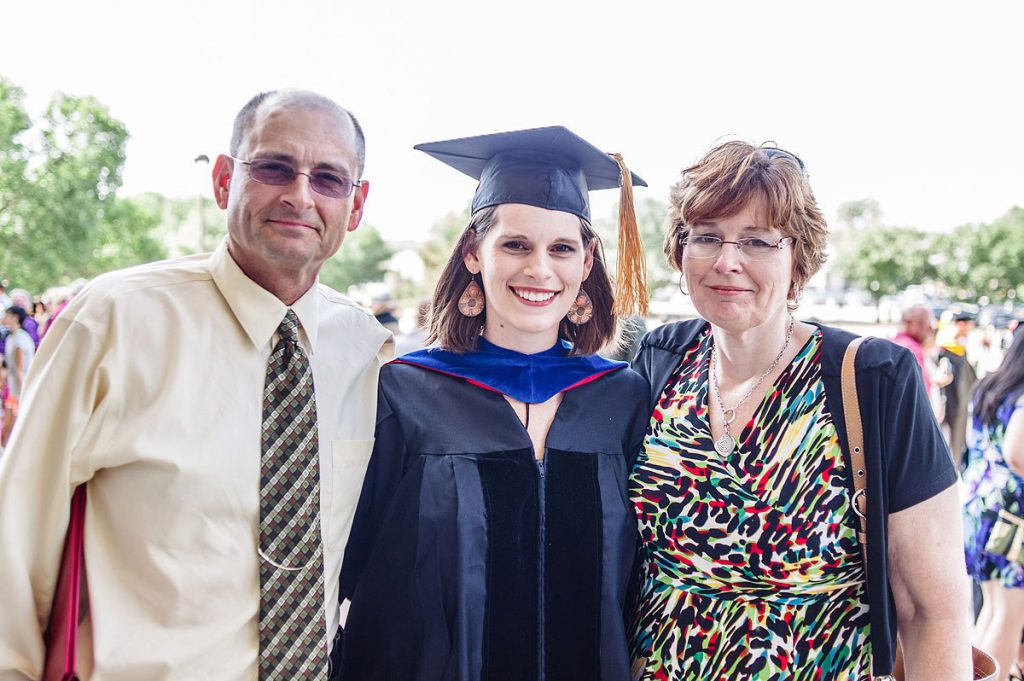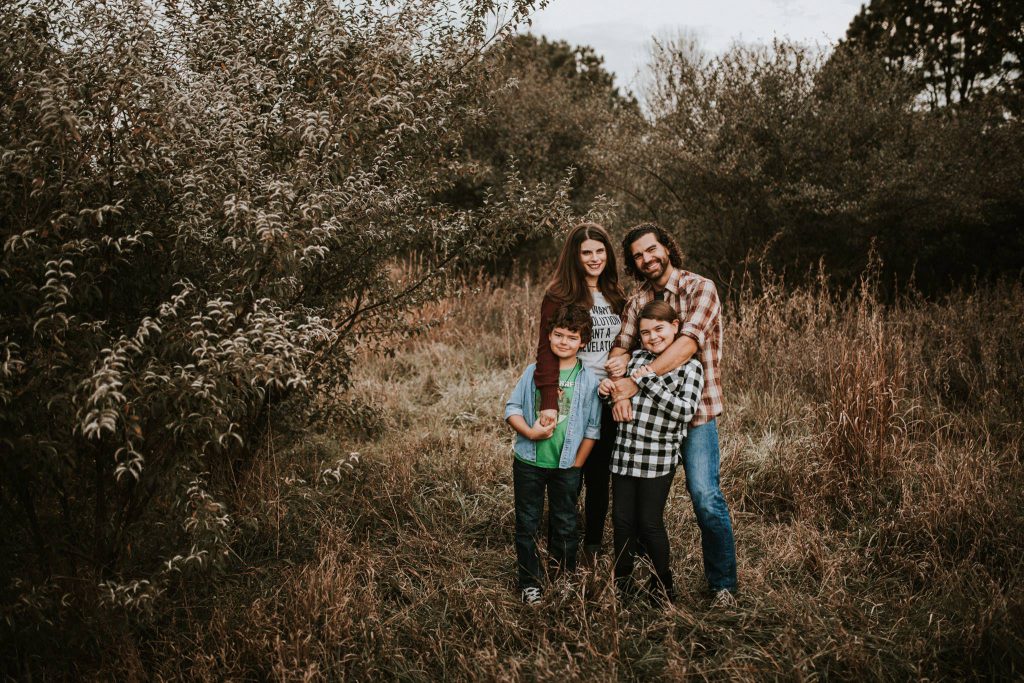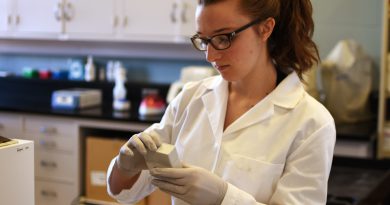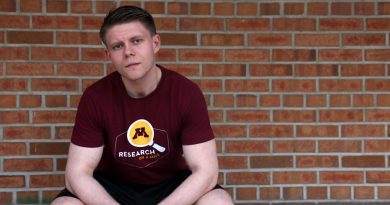Adjustment 101: How a psychologist found her life’s work after her tough first year in college
Allison Bitz can’t forget the day in 2002 when she sat at her dormitory desk in Niedhardt Hall at the University of Nebraska – Lincoln, head down, focused and studying—as always. Nearby, within clear view of her, three floor mates excitedly made plans to see a movie. Bitz’s stomach dropped. No invitation. No bother. No second glance.
At the time, she couldn’t clearly see the reasons for her situation. All she saw was the pain and confusion of feeling like she had no friends or real connections beyond the long-term ones she had in her hometown of Exeter, Nebraska, population 600.
Years later, Bitz understands: She grew up with the same eight boys and eight girls in her graduating class—from elementary school recess to high school graduation. She never had to make friends, she said, because that’s all there was. So she didn’t learn how to make them, what to do or say, or how to improve her circumstances. So, she suffered in silence.
That suffering is something many rural students experience when they transition from small towns to large universities.

Bitz is familiar with this struggle through more than just personal experience. Eventually, she made it the focus of her Ph.D in UNL’s doctorate program for counseling psychology with her 192-page dissertation, “Does Being Rural Matter?: The Roles of Rurality, Social Support, and Social Self-Efficacy in First-Year College Student Adjustment.”
Her study tried to understand why nearly one in three first-year undergraduates don’t return for a second year—a sign that students could be having trouble adjusting to college life. Bitz wondered how much this trouble stemmed from the remoteness of their hometown and sought to discover if rural and urban students adjust differently in their first year.
She distributed a half-dozen questionnaires to 240 participants—half male, half female, mostly white, both rural and urban—with questions that measured students’ perceptions and attitudes about adjustments, support and well being.
Her findings were unexpected: Rural students reported a higher sense of well being than urban students, higher mental health scores and higher levels of social and emotional well being. She was also surprised to find rural and urban students’ overall adjustments to be statistically equal.
“I really thought that rural students were going to have lower overall levels of adjustment,” Bitz said. “It was heartening to me that they didn’t.”
Avoiding help
But most significantly, she found rural students held more negative attitudes toward seeking professional help. At the time, she didn’t find this related to their adjustment to college.
“In hindsight,” she said, “I do wonder if there’s more to the story.”

Do rural students have different ways of adjusting to college in the first year? Which students are the most at risk for leaving? Which are most poised for success in college? What can, and should, universities do to keep rural students at their schools?
And in fact, Allison thinks this final question is more important than initially meets the eye.
“I think the better we can help [rural students], the better chance they’ll get educated, stay in school and maybe go back to rural Minnesota and boost the community,” she said. “I think if more and more students continue to leave college or just not come back, rural communities will continue to falter and die. I believe in keeping those communities flourishing. Part of the answer is people getting educated and then going back.”
Bitz has her own list of ideas that educational institutions can employ, like having established students, such as juniors or seniors, speak with incoming students about the normal challenges of college transitions. She encourages high schools to require classes in social skills, and universities to build specific communities for rural students. More than anything, she said universities need to work diligently to de-stigmatize and normalize the process of asking for help on campus.
“As a practitioner now, I read [the dissertation] and I’m like, ‘Why didn’t I talk more about this help-seeking thing?’” Bitz said. “That’s probably pretty huge when we come to actually utilizing the resources on campus.”
But it makes sense, she said. There’s fear and distress over asking for help, particularly mental health help, in rural communities. The stigma at home is following students to campus, not just in Nebraska, but in Minnesota, too.
Grace Davis, a University of Minnesota marketing major from Winona County, said she isn’t surprised rural students have difficulties seeking help at the university level.
“Not once in high school was mental health mentioned,” Davis said. “Maybe it was, but never in depth. I feel like there’s definitely a stigma.”
In retrospect, such reluctance to speak openly may have kept Bitz’s family uninformed as well. Her mom, Shari Michl, said she had no idea her daughter was struggling in college, and still questions why Bitz kept her in the dark.
“She never told us at all,” Shari said. “I think she didn’t want to let us down.”
A life of helping
Today, Bitz works in Lincoln at her own private practice, Bitz Psychological Services, where she’s a therapist for young adults.
She said she predominantly offers therapy with a little bit of assessment and an occasional presentation on the side. Her dissertation research, combined with her personal experience, has encouraged clients with rural roots to seek out her services.
In her practice, Bitz tends to see three common themes with rural clients: Fear, confusion and homesickness.

“It’s hard to be away,” Bitz said. “To navigate how often to go home, how often to stay. It just makes my heart hurt, because I remember that.”
Eventually, life improved for Bitz in college. As a junior, she applied for an RA position in her building. Through that experience, she met other RA’s and people on her floor, and after spending time with them and getting to know them better, she made friends. It wasn’t until then that she felt a sense of belonging.
“I think I had to relearn that I was actually a likeable person,” Bitz said. “I had to understand who I was a little bit better.”
Nearly 15 years later, Bitz not only understands, but is confident in who she is. She’s a novelist, plays club volleyball, and loves to hit up a karaoke bar when she has the chance. She’s a mom, a wife, a daughter, a colleague, and for her clients, a life-changer.
But before she was any of those things, she was just a small-town girl from rural Nebraska.


